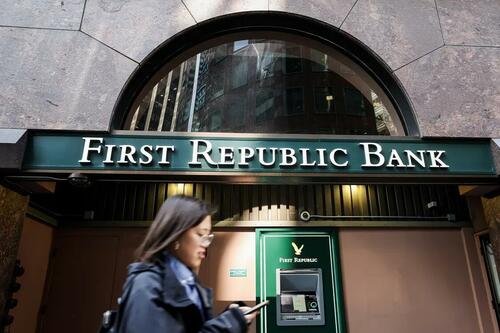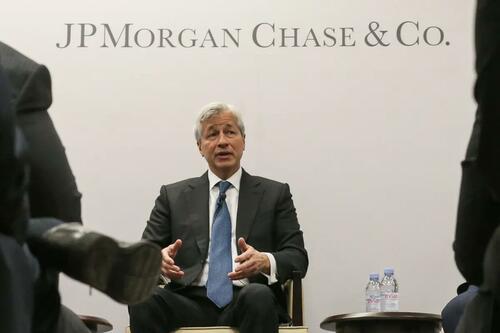Authored by Emel Akan via The Epoch Times (emphasis ours),
The U.S. financial system launched into a rollercoaster trip in 2023, grappling with excessive inflation, hovering rates of interest, wars overseas, and a shaky banking sector.
This time final 12 months, the U.S. financial system was bracing for an impending recession. Issues a couple of recession endured by means of 2023, notably following the banking turmoil within the second quarter, which witnessed a Nineteen Thirties-style financial institution run on Silicon Valley and First Republic Banks.
The Federal Reserve intervened with emergency measures, and consequently, financial institution liquidity recovered and monetary and credit score markets quickly normalized, as if the disaster had by no means occurred.
Within the months that adopted, the U.S. financial system surpassed expectations and defied recession fears. The financial system grew at a faster-than-expected 4.9 % within the third quarter, boosted by sturdy client and authorities spending.
At the moment, there’s rising speak concerning the prospect of a “delicate touchdown” in 2024. Nonetheless, economists stay cautious, with many anticipating a bumpy trip forward as a result of lingering results of tight financial coverage over the previous two years.
Though the financial system has proven resilience within the face of quite a few challenges, many analysts predict a big slowdown within the coming months, with some even anticipating a recession.
“Whereas up to now financial development has held up effectively and inflation has been coming down, there’s a excessive threat that we’ll expertise an financial recession earlier than the 2024 election,” Desmond Lachman, senior fellow on the American Enterprise Institute, instructed The Epoch Occasions.
The U.S. financial system is but to see “the complete results of the Federal Reserve’s financial coverage tightening, and there are main issues within the business actual property house that would set off one other regional banking sector disaster.”
The Convention Board, a nonprofit enterprise assume tank, predicts that the recession will arrive within the first half of the 12 months.
“We forecast two quarters of unfavourable development that can be broadly felt throughout the financial system,” Erik Lundh, principal economist on the Convention Board, mentioned in a current report.

Though this contraction can be restricted in depth and period, Mr. Lundh mentioned he nonetheless expects it to be formally designated as a recession.
Jamie Dimon, CEO of JPMorgan Chase, is extra pessimistic. Throughout a speech on the New York Occasions DealBook summit in November 2023, he cautioned Wall Avenue to not fall for strong financial development. Inflationary pressures, he mentioned, may persist, and a recession shouldn’t be dominated out.
Mr. Dimon described the U.S. financial system as being on a “sugar excessive” from stimulus cash handed out in the course of the pandemic and the Fed’s quantitative easing.
“They’re medicine working by means of the system,” he mentioned. “So I’m fairly cautious concerning the financial system.”
Many analysts anticipate the upcoming election to be a big supply of uncertainty and anxiousness across the financial system.

Inflation: A Glimmer of Hope?
All through 2023, Individuals confronted a sequence of challenges in an financial surroundings outlined by rising prices and rates of interest.
Chris Estrada, founding father of Los Angeles-based Nationwide United Auto Transport, a specialised transport supplier, is among the many small enterprise house owners who felt the results of inflation firsthand.
“Excessive inflation in 2023 certainly positioned stress on our trade. Elevated working prices—primarily gasoline and upkeep prices—impacted our margins,” he instructed The Epoch Occasions.
“Excessive rates of interest additionally posed challenges, particularly when investing in fleet upgrades and growth.”
There’s a risk that inflation will proceed to sluggish in 2024, assuaging among the monetary pressures confronted by individuals comparable to Mr. Estrada.
On Jan. 3, the nationwide common for gasoline was at $3.09 per gallon, down from $3.24 a month in the past, in accordance with AAA data.
GasBuddy projections say that the common fuel worth in the USA for 2024 can be about $3.38 per gallon. This marks a decline from the 2023 common of $3.51 and a big drop from the 2022 common of $3.95 per gallon.

In response to GasBuddy’s estimates, Individuals may save almost $32 billion on gasoline bills in contrast with 2023.
Worries concerning potential vitality market disruptions arising from tensions within the Purple Sea have induced current spikes in oil costs. Nonetheless, elevated U.S. manufacturing and weakening demand in China are anticipated to exert downward stress on oil markets.
“On inflation, we anticipate to see progress over the approaching quarters, however the path will most likely be bumpy,” Mr. Lundh acknowledged. He predicted that the Fed’s 2 % goal gained’t be met till the tip of this 12 months.
Over the previous 12 months, inflation has been easing, however Individuals nonetheless haven’t skilled inflation charges of this magnitude because the early Nineteen Eighties. The annual inflation price has considerably dropped from its peak of 9.1 % in June 2022 to three.1 % in November 2023.
“Pundits, politicians, and traders deal with the speed of change, however that doesn’t match the expertise of American customers, who’re nonetheless paying 18 % to twenty % extra for almost every thing,” Nancy Tengler, CEO of Laffer Tengler Investments, mentioned in a current notice to shoppers.
“As inflation slows, although, actual costs will decline. And a few areas of the products market are downright deflationary. That may assist the common American’s pocketbook.”
Regardless of these predictions, roughly 63 % of Individuals don’t anticipate an enchancment of their monetary scenario this 12 months, in accordance with a current Bankrate survey.
The primary trigger of monetary pessimism is inflation. Even whereas inflation is declining, most costs stay larger than what Individuals are used to, which is why they’re not experiencing quick aid. As well as, those that are pessimistic about their monetary future additionally blame their stagnant or lowered incomes.
Cautious Optimism in Jobs Market
In 2023, wage expectations rose significantly, in accordance with Jon Hill, CEO of The Energists, a Houston-based recruiting agency for the vitality trade.
“That is truthful from a job seeker or worker’s perspective—when inflation is excessive, accepting the identical pay they’d have earlier than is functionally taking a pay reduce,” he instructed The Epoch Occasions. “That mentioned, since companies are additionally feeling the affect of upper prices and inflation, this places additional stress on payroll budgets, that are already tight.”
Mr. Hill mentioned his shoppers are cautiously optimistic about 2024, amid financial and political uncertainties.
“Most of the corporations we work with have already shared their plans to ramp up their recruitment efforts within the coming 12 months in anticipation of future development or to fill ongoing vacancies from the previous 12 months,” he mentioned.
Nonetheless, many analysts predict that the labor market will soften in 2024, with hiring slowing considerably in contrast with the earlier two years, leading to a rise within the unemployment price by 12 months’s finish.

The Fed within the Highlight
Throughout its ultimate coverage assembly of the 12 months, in mid-December 2023, the Fed predicted three price cuts in 2024. Wall Avenue has since began a brand new spherical of guessing video games. Due to its affect on financial exercise and funding technique, the central financial institution’s actions in 2024 would be the topic of a lot hypothesis and dialogue.
The December Federal Open Market Committee coverage assembly minutes launched on Jan. 3 confirmed that the Fed officers agreed to decrease rates of interest in 2024 however offered little info concerning the tempo, timing, and dimension of price changes due to uncertainties about how the financial system will evolve.
Earlier than the Fed begins reducing rates of interest, there must be extra progress on inflation, in accordance with Greg McBride, chief monetary analyst at Bankrate.
“The secret’s going to be shelter inflation, which has the most important affect on the core inflation barometers, and the place the lagged information has made enchancment extra elusive up to now,” he mentioned in a current report.
“If shelter inflation eases, core inflation will ease additional, and the Fed will have the ability to trim rates of interest consistent with the decline in core inflation.”
In response to JPMorgan’s strategists, the Fed may start reducing rates of interest within the second half of 2024. The financial institution expects a gradual discount in charges if inflation returns to regular ranges and anticipates a quicker tempo of price cuts within the occasion of a recession.
Learn extra here…
Loading…

